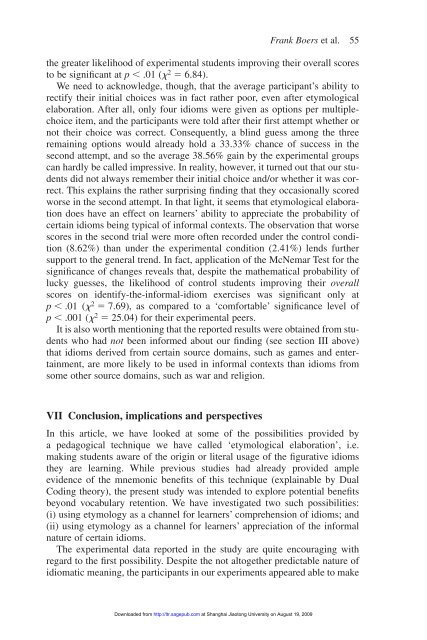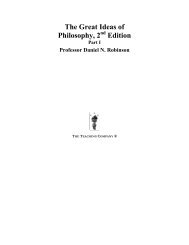Language Teaching Research
Language Teaching Research
Language Teaching Research
Create successful ePaper yourself
Turn your PDF publications into a flip-book with our unique Google optimized e-Paper software.
the greater likelihood of experimental students improving their overall scores<br />
to be significant at p .01 ( 2 6.84).<br />
We need to acknowledge, though, that the average participant’s ability to<br />
rectify their initial choices was in fact rather poor, even after etymological<br />
elaboration. After all, only four idioms were given as options per multiplechoice<br />
item, and the participants were told after their first attempt whether or<br />
not their choice was correct. Consequently, a blind guess among the three<br />
remaining options would already hold a 33.33% chance of success in the<br />
second attempt, and so the average 38.56% gain by the experimental groups<br />
can hardly be called impressive. In reality, however, it turned out that our students<br />
did not always remember their initial choice and/or whether it was correct.<br />
This explains the rather surprising finding that they occasionally scored<br />
worse in the second attempt. In that light, it seems that etymological elaboration<br />
does have an effect on learners’ ability to appreciate the probability of<br />
certain idioms being typical of informal contexts. The observation that worse<br />
scores in the second trial were more often recorded under the control condition<br />
(8.62%) than under the experimental condition (2.41%) lends further<br />
support to the general trend. In fact, application of the McNemar Test for the<br />
significance of changes reveals that, despite the mathematical probability of<br />
lucky guesses, the likelihood of control students improving their overall<br />
scores on identify-the-informal-idiom exercises was significant only at<br />
p .01 ( 2 7.69), as compared to a ‘comfortable’ significance level of<br />
p .001 ( 2 25.04) for their experimental peers.<br />
It is also worth mentioning that the reported results were obtained from students<br />
who had not been informed about our finding (see section III above)<br />
that idioms derived from certain source domains, such as games and entertainment,<br />
are more likely to be used in informal contexts than idioms from<br />
some other source domains, such as war and religion.<br />
VII Conclusion, implications and perspectives<br />
Frank Boers et al. 55<br />
In this article, we have looked at some of the possibilities provided by<br />
a pedagogical technique we have called ‘etymological elaboration’, i.e.<br />
making students aware of the origin or literal usage of the figurative idioms<br />
they are learning. While previous studies had already provided ample<br />
evidence of the mnemonic benefits of this technique (explainable by Dual<br />
Coding theory), the present study was intended to explore potential benefits<br />
beyond vocabulary retention. We have investigated two such possibilities:<br />
(i) using etymology as a channel for learners’ comprehension of idioms; and<br />
(ii) using etymology as a channel for learners’ appreciation of the informal<br />
nature of certain idioms.<br />
The experimental data reported in the study are quite encouraging with<br />
regard to the first possibility. Despite the not altogether predictable nature of<br />
idiomatic meaning, the participants in our experiments appeared able to make<br />
Downloaded from<br />
http://ltr.sagepub.com at Shanghai Jiaotong University on August 19, 2009














